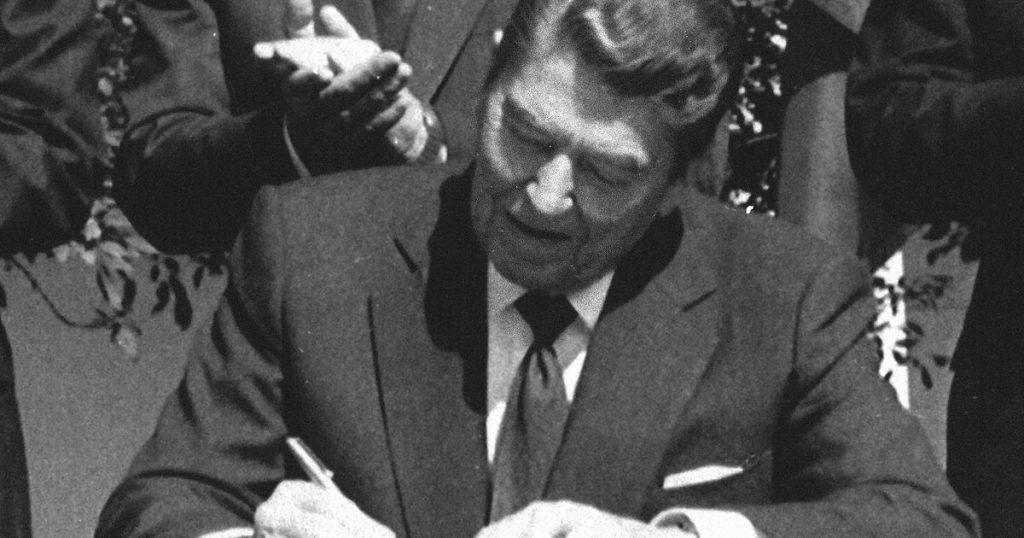Listen to the article
Canadian Trade Ad Sparks Diplomatic Tension with Trump Administration
A political advertisement released by the Ontario government criticizing U.S. trade policy has ignited a diplomatic row, with former President Donald Trump announcing the suspension of trade negotiations with Canada.
The controversy centers on a one-minute commercial featuring clips of President Ronald Reagan speaking about tariffs in his April 25, 1987, radio address. Trump responded to the advertisement on October 23 through a post on Truth Social, claiming the ad fraudulently misrepresented Reagan’s views on tariffs.
“The Ronald Reagan Foundation has just announced that Canada has fraudulently used an advertisement, which is FAKE, featuring Ronald Reagan speaking negatively about Tariffs,” Trump wrote. The Ronald Reagan Presidential Foundation and Institute, a nonprofit organization based in California established to preserve Reagan’s legacy, issued a statement claiming the advertisement used “selective audio and video” that “misrepresents the Presidential Radio Address.”
The advertisement, part of a planned $75 million media campaign authorized by Ontario Premier Doug Ford, began airing on major networks on October 14. The commercial presents Reagan warning about the dangers of tariffs, stating that “high tariffs inevitably lead to retaliation by foreign countries and the triggering of fierce trade wars.”
While the ad did rearrange some of Reagan’s statements from their original sequence, fact-checkers found that these edits did not fundamentally alter Reagan’s expressed views on tariff policy. More significantly, the advertisement omitted context about Reagan’s own trade actions at the time of the original address.
In the unedited 1987 address, Reagan had explained that he recently imposed duties on certain Japanese semiconductor products in response to Japan’s failure to enforce an existing trade agreement. Reagan characterized this move as “a special case” meant to “deal with a particular problem, not begin a trade war,” emphasizing that imposing tariffs was something he was “loath to take.”
Reagan’s actual trade record reveals a more nuanced approach than portrayed in the Ontario advertisement. While generally supportive of free trade—championing agreements like the 1988 U.S.-Canada Free Trade Agreement that later evolved into NAFTA—Reagan did implement protectionist measures throughout his presidency. These included sugar quotas, textile import restrictions, tariffs on Canadian lumber, and “voluntary export restraints” on steel and automobiles from foreign producers.
The diplomatic impact of the advertisement was immediate. After Trump’s announcement that the United States would cease trade negotiations with Canada, Premier Ford stated on October 24 that while the ad would continue to air during the first two World Series games, it would be paused afterward “so that trade talks can resume.”
The incident highlights the ongoing tensions surrounding trade policy between the United States and Canada, two nations whose economies remain deeply intertwined. Canada is the United States’ largest trading partner, with approximately $2.6 billion in goods and services crossing the border daily.
Trade experts note that the timing of the advertisement reflects growing concerns in Canada about the potential return of protectionist policies should Trump win the upcoming U.S. presidential election. During his previous administration, Trump renegotiated NAFTA into the USMCA (United States-Mexico-Canada Agreement) and imposed tariffs on Canadian steel and aluminum, citing national security concerns.
When asked about the advertisement, a White House spokesperson simply noted that “Even The Ronald Reagan Presidential Foundation and Institute is calling out Ontario’s misleading and selective editing of President Reagan’s remarks.” The Reagan Foundation itself did not respond to requests for further clarification on how specifically the advertisement misrepresented Reagan’s address.
The dispute underscores how historical references and selective quoting of past leaders can become flashpoints in contemporary trade diplomacy, particularly in an era of heightened economic nationalism and uncertainty in global trade relations.
Fact Checker
Verify the accuracy of this article using The Disinformation Commission analysis and real-time sources.




10 Comments
The use of Reagan’s remarks in this Canadian ad seems like a strategic move, but the concerns raised about misrepresentation are understandable. It will be worth watching how this plays out.
Agreed. Selective editing of historical quotes can be a slippery slope, even if the intent is to make a valid policy point. Transparency and accuracy are important, especially on sensitive trade issues.
This highlights the challenges of using political figures’ words out of context. While the ad may have a point about tariffs, the Reagan Foundation’s concerns about selective editing are understandable.
Yeah, it’s a fine line to walk between making a compelling argument and being fully truthful. Curious to see if the Canadian government responds to the Reagan Foundation’s statement.
The Trump administration’s strong reaction to this ad is telling. It suggests they feel the message resonates and may want to avoid further diplomatic tensions with Canada on trade.
Good point. The US seems sensitive about any criticism of its trade policies, even if it’s using the words of a former Republican president.
This ad highlights the ongoing tensions around trade and tariffs between the US and its neighbors. It will be interesting to see if the two countries can find a diplomatic resolution to this dispute.
Absolutely. Trade policy is a complex and politically charged issue, and these types of back-and-forth disputes can further strain relations if not handled carefully.
Interesting controversy over the use of Reagan’s remarks in this Canadian ad. Seems like a tricky balance between political messaging and accurately representing historical statements.
I agree, it’s important to be transparent about the context and not misrepresent quotes. Curious to see how this plays out diplomatically between the US and Canada.